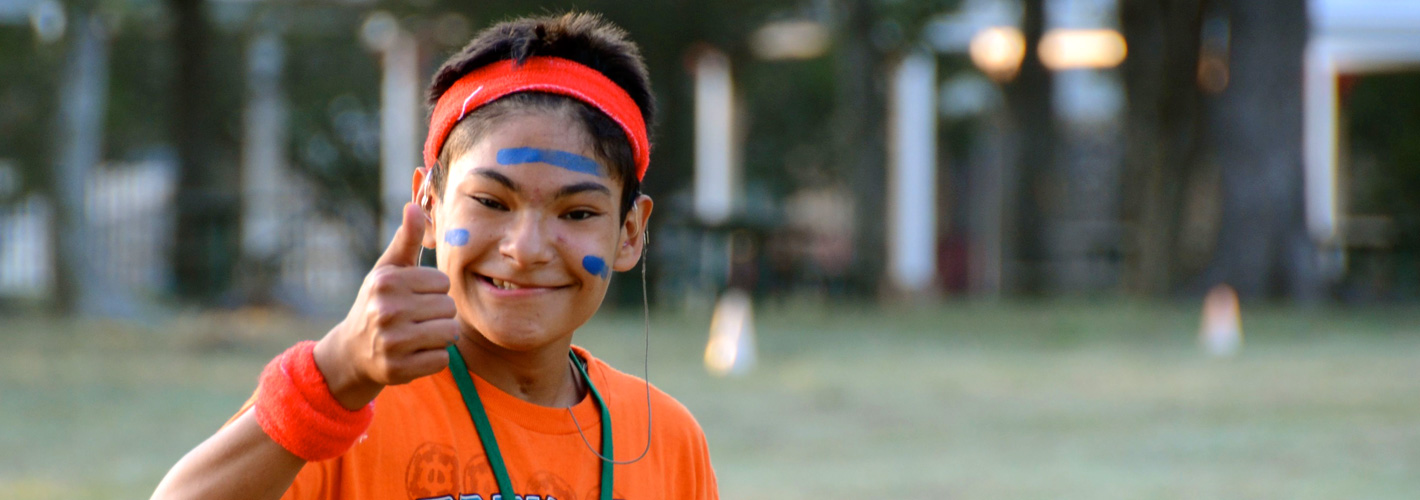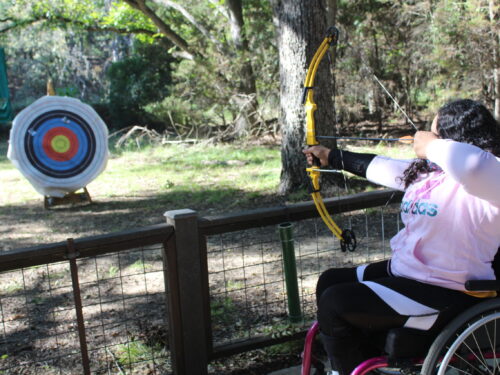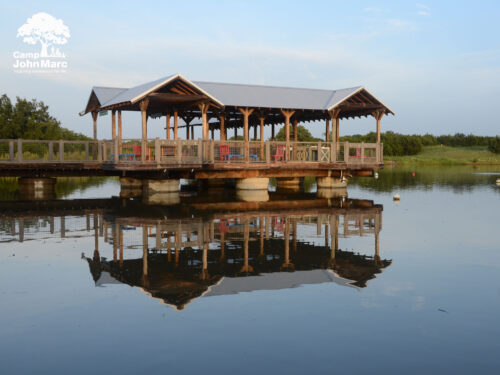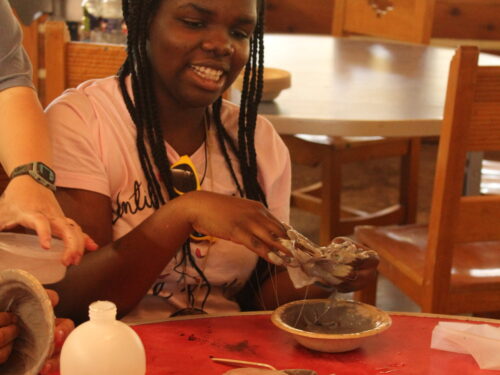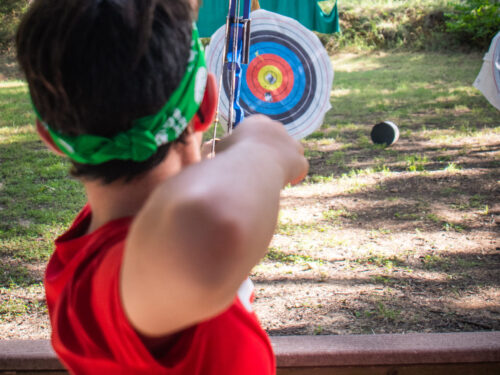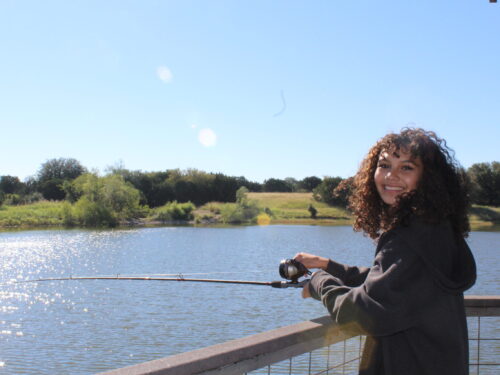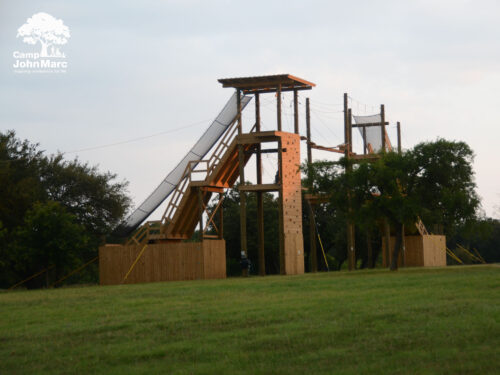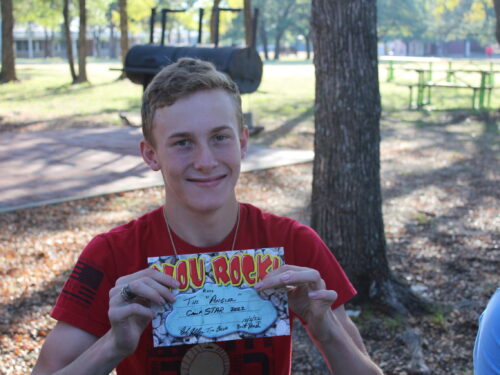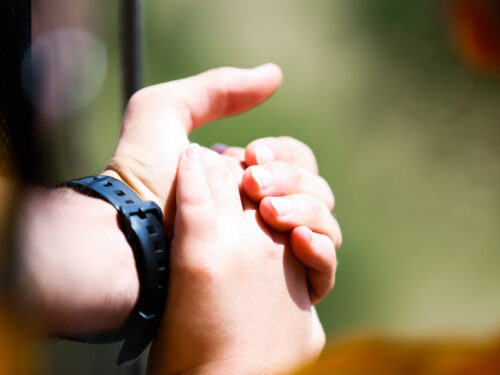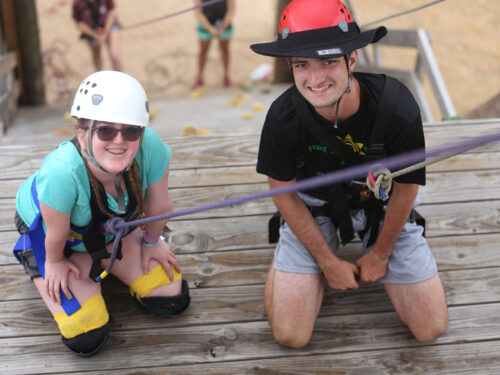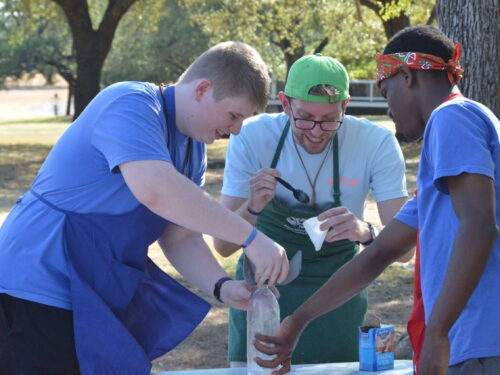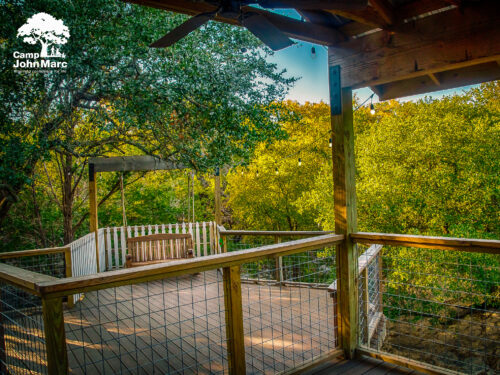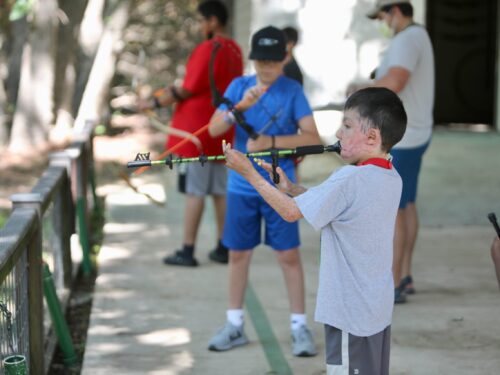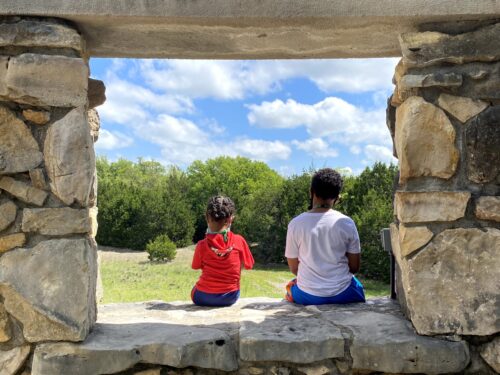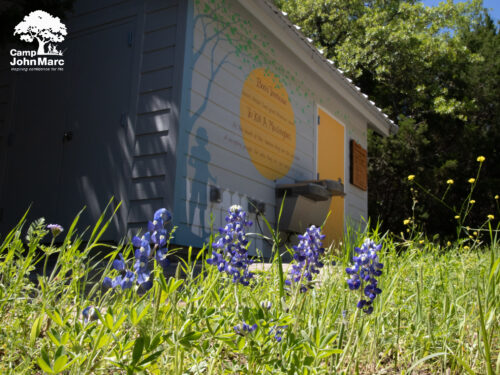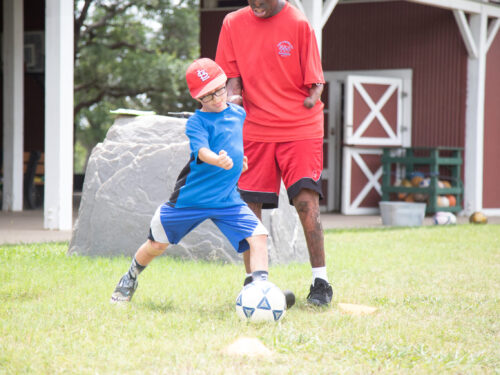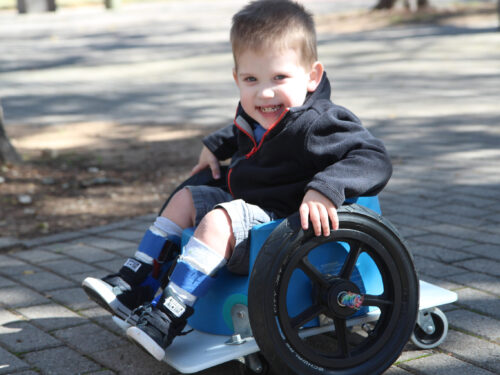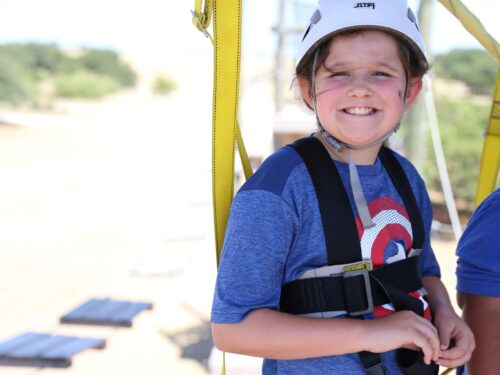Camp John Marc Volunteer Information
Please review the information below. If you have any questions, please contact a Camp John Marc Director.
Volunteer Training Video
What kinds of activities are at camp?
You will be asked to help assist or lead one of these activities. If you have a talent or skill that would be useful, PLEASE let us know. If not, don’t worry, we’ll provide the training for activities if necessary.
DAYTIME
- *ARCHERY: Teach campers the basics of using a bow and arrow while playing some fun target games!
- *CHALLENGE COURSE: Help campers climb the multi-element ropes course or assist on the tower with the zip-line.
- COOKING: We provide the recipes and ingredients—you help give the campers an opportunity to become masters of the kitchen.
- FISHING: A camp classic! Hook worms, tie knots, and teach campers how to cast. Come try and catch the legendary Catfish Netter.
- NATURE: Share your love and knowledge of the great outdoors by taking children on nature hikes, scavenger hunts, nature BINGO, and exploring the Texas wildlife.
- SPORTS and GAMES: Help facilitate a great game of knock-out or set up a disc golf course. Our sports barn is stocked with equipment for basketball, soccer, football, hockey, disc golf, bowling, parachute games, and plenty more.
- WEIRD SCIENCE: Exploding volcanoes, GAK, summertime snow, and more! Teach the campers about how fun science can be.
* These areas require certifications.
EVENING ACTIVITIES
- CAMPFIRE: Enjoy the warmth of a campfire as well as the tastiness of a good s’more! Volunteers assist in the s’more setup and clean up as well as lead some songs and stories.
- CARNIVAL: What better way to wrap up a day than with a party?! Volunteers sign-up for a station/booth at our Camp Carnival; stations include face painting, snow cone making, BINGO calling, and more!
- MINUTE TO WIN IT: Nothing brings the campers together more than some MTWI challenges. Volunteers help set up and demonstrate simple games that encourage the campers to work together to accomplish a challenge … in a minute!
- NIGHT HIKE/STARGAZING: Getting outdoors on a cool night is such a treat so after some of our evening activities, we take a camp-wide Night Hike to Stargazing where songs and stories bring the campers together under a blanket of stars.
What does a typical camp schedule look like?
Weekend Camp Sample Schedule
Friday
4:30-6:30 PM Families arrive and Check In
7:00-7:45 PM Dinner
8:00-9:00 PM Introductions/Games
9:30-10:30 PM CJM Weekend Staff Meeting
Saturday
8:30 AM Breakfast
9:30-10:30 AM Activity One
10:45-11:45 AM Activity Two
12:00-12:45 PM Lunch
12:45-2:00 PM Free Time/Rest Time
2:00-3:15 PM Parent Group…CJM takes the kids for activities
3:30-4:30 PM Activity Three
4:45-5:45 PM Activity Four
6:15 PM Dinner
7:30-9:00 PM Camp Carnival
Sunday
8:30-9:15 AM Breakfast
9:30-10:30 AM Group Picture /Chapel Service
11:00 AM Load Vehicles and Depart
What should I pack for a weekend?
What to Bring
As you pack for Camp, keep in mind that camp life is meant to promote “simple” lifestyles. You will need comfortable clothing. We do not allow open-toed or open-heeled shoes while camps are in session.
CLOTHING
___T-Shirts/Long Sleeves
___Shorts
___Swimsuit–SEASONAL (conservative 1 piece for ladies, trunk style for men)
___Sweatshirt (for cool evenings)
___Socks
___Undergarments
___Tennis Shoes
___Rain Boots
___Rain Jacket
___Hat/Baseball Cap (optional w/college logo)
OTHER ITEMS
___Sunglasses
___Personal Hygiene Items
___Towels (for shower and pool)
___Mattress Cover, Mattress Pad, Sheets, Blanket, Pillow for twin bed OR Sleeping Bag (beds are heavy plastic/vinyl, egg crate will help)
___Flashlight/Headlamp
___Backpack
___Camera (optional)
___Alarm Clock
___Wrist Watch
REDUCE. REUSE. RECYCLE:
• Water Bottle (Nalgene)
• Coffee/Tea Mug
How do I get to camp?
The CJM Director for the weekend will out send out maps and information the Monday before the weekend. Sometimes GPS can take you on a DIRT road, especially if you are coming in from Waco/Austin/South of Camp. Our recommendation is to follow the maps given by the CJM director for the weekend and NOT your GPS. Alternatively, you are able to reference the paper map to your GPS to make sure you are coming to Camp on the PAVED road.
What if I feel sick before the weekend?
Camp John Marc has established the health policy minimums that staff/volunteers who have had a fever, influenza-like symptoms, or other epidemic-like symptoms within 7 days of Camp are not permitted to come to camp to protect the health of campers and families.
If you are unable to attend the weekend, please email the CJM director of the weekend to let them know.
Please review CJM's personnel policies:
Camper Care Document
CAMPER CARE
Discipline of Campers
At no time, and not for any reason, is there to be any physical or emotional punishment of campers. Any such conduct by a staff/volunteer will result in such staff/volunteer’s immediate termination. Physical punishment is not the same as physical restraint. A camper hitting other campers, biting or using dangerous objects may need to be physically restrained for the protection of the other campers. Punishments, such as isolating problem campers from others, verbally threatening, or acts which involve campers’ personal belongings are not permissive for use by the counselor. The matter regarding physical punishment is for your own protection. Any physical punishment of campers will be met with dismissal. If you have a camper who is continually physically abusing or tormenting others, inform the Child Life Specialist. If necessary (in an extreme situation), it will be suggested that the camper be sent home. Camp is for all and this sort of behavior is unfair to the other campers.
Fraternization Among Campers and Volunteers
Campers and staff/volunteers should not have contact outside of camp unless with the approval of the Camp Volunteer Coordinator or Camp Director or involving camp sponsored activities. This includes phone conversations, letters, e-mails, exchanges through social network websites such as, but not limited to, Instant Messaging, Facebook, MySpace, and Twitter, baby-sitting, employment opportunities or meetings. The sponsoring organization should offer guidelines and training for volunteers and staff.
Child Abuse Statement and Policy
We are aware that some people apply for jobs in camp settings for the wrong reasons-because they are interested in children sexually. As a volunteer, you should know that we make an active, and we believe, effective effort to prevent child sexual abuse. We structure our program so staff are not left alone with kids. No volunteer is allowed to go anywhere alone with a child. We try to prevent any opportunity for molestation. We periodically interview children about their experiences in our program. We take any allegations by children very seriously. We refer all allegations to the State of Texas for investigation. We cooperate fully with any investigation. Below are the high-points of the policy.
1. Volunteers are not permitted to be alone with individual children.
2. Adults and children may not sleep together under any circumstances.
3. If a child is injured and requires first aid, they will be examined by the nurse in the presence of another adult.
4. Staff/volunteers may not invite children to their homes or have other contact with children outside the camp setting without prior administrative approval.
5. Children are only released to their legal guardian or someone designated in writing by the guardian.
6. Children may not be touched in areas of their bodies that would be covered by swimming suits.
7. Staff/volunteers may not use physical punishment, verbally abusive comments, or denial of the necessities of care to children.
8. Staff/volunteers must immediately report any signs of injury or possible child abuse.
Confidentiality Statement/HIPPA
As part of becoming professionals, we must learn the importance of confidentiality with our campers, clients, or patients. Early in the learning process, we learn to distinguish between appropriate and inappropriate settings to share personal information. Information gained at Camp is to be used/shared for general purposes only; i.e., to learn and understand. When sharing information in class reports about campers and/or their experiences, use only the camper’s first names.
Any medical information (diagnosis or medical history), received from Camp John Marc about campers is privileged and should not be discussed in front of other campers, volunteers or staff. Questions or concerns about individual campers and their special needs should be directed to the Camp Director or Medical Director at an appropriate time.
Staff/volunteers will treat with the utmost respect and confidentiality all patient/camper information that is received during pre-camp or camp briefing sessions. This information is protected health information (PHI) under the Health Insurance Portability and Accountability Act (HIPAA). [PHI definition: Information that is oral or recorded in any form or medium that relates to the past, present or future physical condition of an individual.]
Universal Precautions and Camper Medical Care
In the unique camp setting of Camp John Marc it is necessary to have a statement which reflects the Center for Disease Control’s concern for the transmission of HIV, Hepatitis B and other blood borne pathogens. As a volunteer, it is necessary for you to be aware of these precautions to prevent the transmission of these diseases. It is called “Universal Precautions” because everyone is treated the same regardless of their blood borne infection status.
For your safety, universal precautions apply to blood and any fluids containing visible blood. As a volunteer you may come in contact with a camper who has scraped a knee or cut themselves while at an activity area. It is your responsibility to get that individual to first aid at the medical building or to qualified staff. Should you be the person to administer first aid make sure you have a barrier between you and the camper’s blood. Barriers include rubber and plastic gloves, cloth, a T- shirt, paper towels, a bandanna, whatever you can put between you and the blood. The best barrier is unbroken skin If the camper is old enough you can give them the barrier to stop the bleeding and/or apply the bandage if necessary.
Any injury or illness of a camper must be reported to the Medical Director immediately. Only Medical Staff will dispense medications to campers. A volunteer should only attempt basic first aid for minor cuts. Volunteers will contact the Medical Staff for immediate assistance regarding major camper care issues
Texas Department of Health (July, 1988) Update: Universal Precautions for prevention of Transmission of Human Immunodeficiency Virus, Hepatitis B, and other Blood borne Pathogens in Health-Care Settings; as well as the Medical Staff from Children’s Medical Hospital Dallas.
